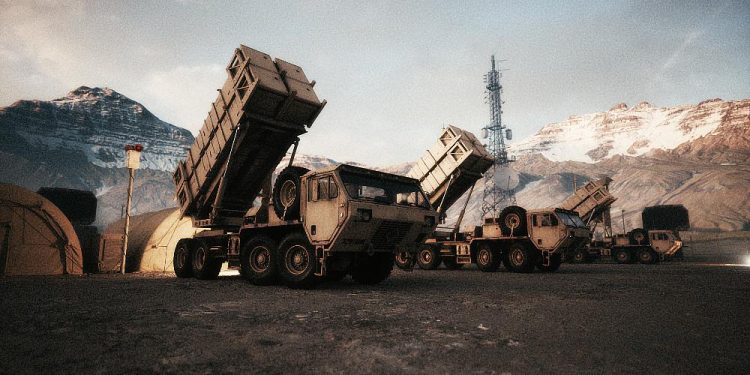(End of the American Dream)—What in the world has happened to our military? When I was growing up, I was proud that my father was an officer in the U.S. Navy. At that time we possessed the most powerful military in the entire world by a wide margin, and as a result nobody wanted to mess with us. But now everything has changed. Our military has been transformed into a “woke” joke, and we all saw what happened during the absolutely disastrous withdrawal from Afghanistan. We desperately need to get our act together, because war is coming. In fact, we could soon find ourselves fighting multiple major wars simultaneously. Unfortunately, a study that was just released by a congressional panel concluded that we are not even ready to fight one major war at this point…
The U.S. military is no longer “prepared” to fight in a major war, according to a new study conducted by a congressional panel.
Though the threats the U.S. is facing are “the most serious and most challenging” it has seen in almost a century, the U.S. defense base is not equipped to meet the moment, according to a report from the Commission on the National Defense Strategy published on Monday. Among the biggest problems outlined in the report are a troubled Pentagon and a failure by the federal government to properly address threats emanating from adversaries like China and Russia.
“The United States last fought a global conflict during World War II, which ended nearly 80 years ago. The nation was last prepared for such a fight during the Cold War, which ended 35 years ago. It is not prepared today,” the commission’s report reads.
How is this possible? We spent 820 billion dollars on national defense during the most recent fiscal year. Where is all of that money going?
Two of the areas that the study really focused on were our “recruiting failures” and our “grossly inadequate” industrial base…
The commission recommended in a 132-page report released Monday that the U.S. overhaul its national defense strategy and $900 billion defense budget to address recruiting failures, a “grossly inadequate” industrial base, and underfunded cyber and space domains. The commission was tasked by Congress with analyzing the 2022 defense strategy, which was written prior to Russia’s 2022 invasion of Ukraine and the evolution of the strategic partnership between China, Russia, Iran, and North Korea.
“There is potential for near-term war and a potential that we might lose such a conflict,” Eric Edelman, vice chairman of the Commission on the National Defense Strategy, told senators.
In the days following 9/11, our military was swamped with more eager recruits than they could possibly handle.
But now it has become very difficult to convince young people to join our “woke” military. In particular, male enlistment is way, way down…
The issue is convincing men to put on the uniform.
A decade of declining recruitment numbers for the Army is almost entirely attributable to a significant drop in male recruiting as female enlistments have remained relatively flat, internal service data reviewed by Military.com shows.
Since 2013, male enlistments have dropped 35%, going from 58,000 men enlisting in 2013 to 37,700 in 2023, according to the service data. Meanwhile, female recruitment has hovered around 10,000 recruits each year.
This is a topic that I have been hammering on for a long time. In fact, in my most recent book I have an entire chapter entitled “Chaos In The Military”. Sadly, most Americans have absolutely no idea how much our national defense has been compromised.
As long as we don’t have to fight any major wars, our failures can be hidden to a certain extent.
Unfortunately, three major wars are rapidly approaching.
The Middle East is on the verge of erupting in flames, and Secretary of Defense Lloyd Austin says that the U.S. would intervene militarily if all-out war breaks out…
The United States would help Israel defend itself should a full-scale war break out with Lebanon, the country’s Secretary of Defense Lloyd Austin told reporters in the Philippines as Lebanon braced for an IDF counterstrike.
“We remain concerned about the potential of this escalating into a full fight. And I don’t believe that a fight is inevitable,” Austin said.
I still think that we have a couple of months before things in the region go totally haywire.
Hopefully I am not wrong about that.
Alarmingly, the State Department has just issued a warning instructing U.S. citizens not to travel to Lebanon right now…
The United States on Wednesday urged its citizens to not travel to Lebanon, citing rising tensions between Israel and the Lebanon-based Hezbollah group.
The U.S. State Department raised its travel advisory to Lebanon to level four, which says “Do Not Travel.” The State Department advised Americans in Lebanon to depart if possible.
Meanwhile, the war in Ukraine just continues to escalate and the Russians are steadily gaining ground.
One of the big reasons for this is that the Russians are simply outproducing us.
According to CNN, the Russians are producing almost three times more artillery munitions than the United States and Europe combined…
Russia appears on track to produce nearly three times more artillery munitions than the US and Europe, a key advantage ahead of what is expected to be another Russian offensive in Ukraine later this year.
Russia is producing about 250,000 artillery munitions per month, or about 3 million a year, according to NATO intelligence estimates of Russian defense production shared with CNN, as well as sources familiar with Western efforts to arm Ukraine. Collectively, the US and Europe have the capacity to generate only about 1.2 million munitions annually to send to Kyiv, a senior European intelligence official told CNN.
This is a failure of epic proportions.
How did this happen?
It appears to be just a matter of time before we come into direct conflict with the Russians, and we are definitely not prepared for that.
Of course we could soon find ourselves fighting a major war with China too. The moment that China invades Taiwan, we will be at war with the Chinese.
Sadly, we are not equipped to fight a war with China on the other side of the Pacific.
At this point, China actually has a larger navy than we do…
China now possesses the world’s largest maritime fighting force, operating 234 warships to the U.S. Navy’s 219. This count of China’s fighting ships encompasses all of its known, active-duty manned, missile- or torpedo-armed ships or submarines displacing more than 1,000 metric tons, including the 22 missile-armed corvettes recently transferred to the China Coast Guard but not the approximately 80 missile-armed small patrol craft operated by the PLAN.
Of course not all of our military vessels are currently available.
In fact, there is one aircraft carrier that has been getting “overhauled” since 2021 and won’t be available for service again until 2026 at the earliest…
In 2021, USS John C. Stennis was sent to the shipyard for a routine Refueling and Complex Overhaul (RCOH) mission. It was supposed to take three years. Yet it will probably be delayed even past 2026.
As my colleague Harrison Kass assessed, “Since 2001, the U.S. Navy has conducted seven carrier overhauls. The shortest overhaul was USS Nimitz, at 1129 days. Four overhauls took between 1,338 and 1,506 days – USS Dwight D. Eisenhower, USS Carl Vinson, USS Theodore Roosevelt, and USS Abraham Lincoln.”
The most recent carrier to get an RCOH overhaul, USS George Washington, took an astonishing 2,120 days.
It is pretty sad when you have a 4.5 billion dollar aircraft carrier that can’t even sail for five years.
But this is our military now.
We spend a ton of money on it, but we get very little in return.
So we better hope for peace, because if we have to depend on our “woke” military to fight multiple major wars simultaneously we are going to be in a world of hurt.
Michael’s new book entitled “Chaos” is available in paperback and for the Kindle on Amazon.com, and you can subscribe to his Substack newsletter at michaeltsnyder.substack.com.







Tim Kennedy of the TransSpecial Forces was ruminating why anyone would not want to join the (COMMUNIST) MILLEYTARY — gee, Timmy, we wonder why!
And why do morons like Tim Kennedy and Mark Milley make up America’s TransSpecial Forces or TransSpace Force???